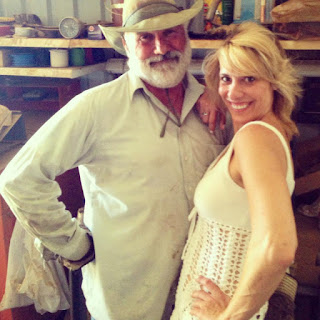A Big Texas Book
 |
| From: Palo Duro Canyon website |
The complete surprise of it. The blue skies, and then the sudden expanse of canyon, a gash in the red earth. The heat. The red dirt that smells like sweat and life and sorrow and love. Texas, the musical. Firecrackers, and a muddy little river bed.
The thirty minute trip into the canyon (it was probably more like five, but I was a girl in high anticipation). The caves that we explored even when we weren't supposed to.
The way of life that has disappeared. More than once. More than twice. More than three times, quite probably. The water is all dried up, just about killing off the farmers, but the family farm just isn't sustainable except as a big enterprise anymore anyway. And before the farmers, the ranchers. We, all of us -- at least those of us who have seen Texas or Oklahoma even once much less over and over -- know that the farmers killed off the ranchers.
Of course the settlers in general ended the Indian way of life. The Mexicans lived with them as best they could, but the Mexicans revolted against Spain, who had taken the land from the earlier indigenous settlers. And before that, long long before that, the great expanse of water covering the land, evaporating and rushing off bit by bit to uncover the prairie and cut out the Canyon.
The Palo Duro Canyon is believed to be the second biggest canyon in the States. What made me dream about it? A book I was reading that I predict you will be hearing a great deal about for sometime.
My rating: 5 of 5 stars
The Son is excellent, the big picture of our state thus far through the voice of several generations. I can't believe Meyer isn't a Texan, but then again, maybe honesty of this scope can't be native born. (I am relieved that he at least lived here!) Hugely important work but also entertaining, compelling. What does this book compare to? In its unabashed portrayal of our history as a society that comes and conquers and goes with lethal injustice in it's wake: Gone with the Wind, To Kill a Mockingbird, even a good bit of Lonesome Dove (without the humor) and All the Pretty Horses, in the way that they invoke a long gone Texas. As I Lay Dying, in its literary talented telling of a family story. Wolf Hall, in its pure, -let's get the story right but with brilliance (but easier to follow). In other words, this is a Big One. If you don't read any other book this year, read this one.
One of the intriguing literary devises of this book that reminded me of Faulkner's As I Lay Dying, was the use of different family member's unique voices to tell the family saga story. There are three main voices: Eli McCullough, the patriarch who was born the year Texas won its freedom from Mexico, his son Peter, who knows the story from a completely different point of view and for that reason sees things in a different light -- he provides the crucial racial injustice element of the Texas story, and then Jeannie, a great, great granddaughter whose voice reminds me of the Texas version of Scarlett O'Hara if there ever was one, in the sense of a lone female with the will power of a small army. The voices are so unique, never bleeding over into each other, that I was gratified to learn that Meyer only wrote them one at a time. In other words, when he was writing Eli, he was only writing Eli, and you can tell. Then he brilliantly wove them together so that you learned the family story only bit by bit, a great hook if ever there was one.
Eli McCullough's story is, of course, the story that literally made me dream of West Texas, Comanche land, the deep red of the Caprock and the shadows of The Palo Duro Canyon, the sun that rises on the Llano Estacado, and the stars that shine at night. And he supplies the traditional (although completely unique and enthralling) Texas Ranger type story that will remind you in some ways of what you have come to expect from the Western greats of the past. But what Meyer does actually goes beyond, because, with the voices of several family members, he is able to explore numerous points of view of the many different types of conquerors that lived in Texas.
Here is a long quote from one of Eli's chapters that poignantly sets up a dialogue that continues in many ways the entire length of the book, an important dialogue of the past and present that is so hard to get right these days.
"Despite Toshaway's promise, we made another cold camp that night. In the morning, we climbed out of the big canyon and onto the plains. There was no timber, no trail, no lines of brush to mark a stream, it was nothing but grass and sky and my stomach felt wobbly just looking at it. I knew where we were: the Llano Estacado. A blank space on the map.
* * *
Then I climbed out of the streambed to have a look. The stars came down to the earth on all sides and the Comanches had pickets looking for other campfires. They ignored me. I went back to our pallet.
A catamount screamed at us for nearly an hour, and wolf calls were echoing from one side of the plain to the other. My brother began to cry out in his sleep; I started to shake him, then stopped. There wasn't any dream he could be having that would be as bad as waking up.
* * *
"You need to eat."
He was smiling. "You know, I never thought a place like this could exist. I'll bet our tracks will be gone with the first wind."
"They're going to kill you if you don't eat."
"They're going to kill me anyway, Eli."
"Eat," I said. "Daddy ate raw meat all the time."
"I'm quite aware that as a Ranger, Daddy did everything. But I am not him. Sorry," he said. He touched my leg. "I started a new poem about Lizzie. Would you like to hear it?"
"All right."
"Your virgin blood, spilled by savages, you are whole again in heaven." Which of course is shit. But it's the best I can do under the circumstances."
* * *
"I'm going to make you a pile of food."
He ignored me. He was staring at something on the ground and then he reached over and pulled up one of the blanketflowers -- we were sitting in a big patch. He held it up for all the Indians to see.
"Note the Indian blanket," he said, "or Indian sunburst."
They ignored him.
He continued in a louder voice.
"It is worth noting that small, stunted, or useless plants -- such as Mexican plum, Mexican walnut, or Mexican apple -- are named after the Mexicans, who will doubtless endure among us for centuries, while colorful or beautiful plants are often named after Indians, as they will soon be vanquished from the earth." He looked around at them. "It's a great compliment to your race. Though if your vanquishing had come a bit earlier, I wouldn't have complained."
No one was paying any attention.
"It's the fate of a man like myself to be misunderstood. That's Goethe, in case you were wondering."
* * *
Then my brother was looking at someone behind me.
"Don't try to help."
View all my reviews










Comments